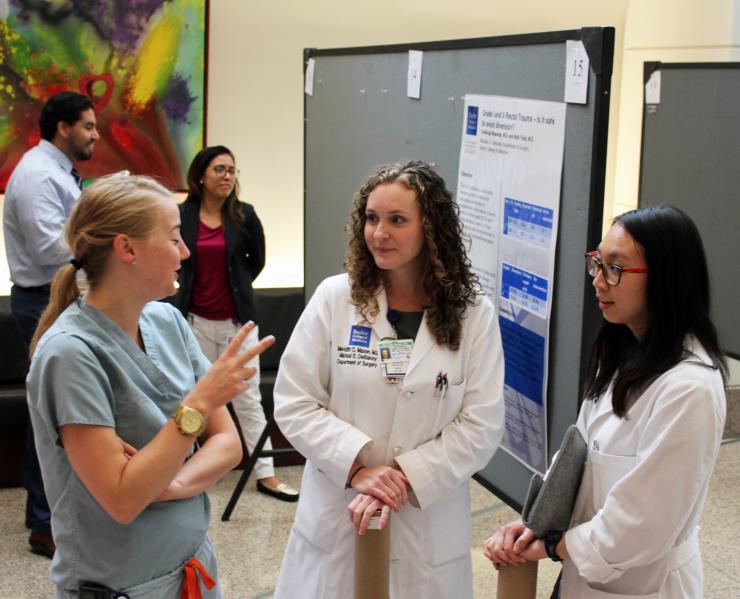Our training program provides extensive opportunities for each of our residents to learn the fundamentals of research because we firmly embrace the principle that the basics of research and academic inquiry are a core competency for all surgeons. All residents participate in a curriculum that teaches the fundamentals of surgical research, and includes discussion of topics ranging from clinical trial design to methods for data analysis to how to write a research paper. All residents also have access to a team of experts in the Office of Surgical Research who can provide guidance in study design, data analysis and scientific writing. Residents are also provided with mentorship and access to the directory of ongoing research projects and faculty research interests to optimize their research experience.
With the support of these resources, all categorical general surgery residents are expected to submit at least three manuscripts to peer-reviewed journals over the course of their residency. Most residents also present their work at local, regional and national scientific conferences; and they receive funding to cover the related travel expenses.
For information about research activities in the Department of Surgery, please see the department research page.
Research Interests of Our Faculty Members
Throughout their training, our residents and fellows participate in research under the mentorship of our expert faculty members whose interests span the gamut of surgical subspecialties and research disciplines. Our faculty conduct research in the laboratories of Baylor College of Medicine, at affiliated hospitals in the Texas Medical Center, and at the Center for Innovations in Quality, Effectiveness & Safety, and through sister institutions at the Texas Medical Center, including Rice University, the University of Houston and MD Anderson Medical Center.
Research Day

We are very proud of the incredible research achievements of our residents, fellows, students, and staff. Each June, we celebrate these achievements at our annual Michael E. DeBakey Department of Surgery Research Day. This half day event, underwritten by the halting of all non-urgent clinical activities, features podium and poster presentations highlighting the research conducted by our trainees, awards for the best presentations, and a keynote address from a distinguished visiting surgeon-scientist. Always attended by several hundred faculty, trainees and students, Research Day is perennially a highlight of our academic year. We are very proud of the incredible research achievements of our residents, fellows, students, and staff. Each June, we celebrate these achievements at our annual Michael E. DeBakey Department of Surgery Research Day. This two day event, underwritten by the halting of all non-urgent clinical activities, features podium and poster presentations highlighting the research conducted by our trainees, awards for the best presentations, and a keynote address from a distinguished visiting surgeon-scientist. Always attended by several hundred faculty, trainees and students, Research Day is perennially a highlight of our academic year.
Surgical Research
The department offers a large research and mentoring infrastructure.
Opportunities are available in basic and clinical science research in the laboratories of Baylor College of Medicine and at the individual hospitals. Many residents choose to spend some time in the research lab, but it is strictly optional. Residents are not required to do research and may complete their clinical training in five years.
For information about research activities in the Department of Surgery, please see the department research page.
Research Expectations
Although not all surgeons need to be trained to be independent researchers, understanding the basics of research is a core competency for all practicing surgeons. Therefore, our training program has developed learning opportunities for residents to gain an understanding of the fundamentals of research. Accordingly, all categorical general surgery residents are expected to submit three manuscripts to peer reviewed journals before the start of their chief year. To help residents meet this goal, the department provides mentorship and resources to optimize resident participation in research projects and scholarly activity.
All residents participate in a curriculum that teaches the fundamentals of surgical research, and includes discussion of topics ranging from clinical trial design to methods for data analysis to how to write a research paper. All residents also have access to a team of experts in the Office of Surgical Research who can provide guidance in study design, data analysis and scientific writing. Residents are also provided with mentorship and access to the directory of ongoing research projects and faculty research interests to optimize their research experience.
Achievements
We are proud of the research achievements of our residents, many of which are highlighted below. While all categorical general surgery residents are expected to submit three manuscripts to peer-reviewed journals before the start of their chief year, many have far more submissions and presentations at regional, national and international meetings. Many also receive major awards for their work. Finally, many of our residents successfully compete for intramural and extramural grants and funding awards, including those provided through the National Institutes of Health Loan Repayment Program.








